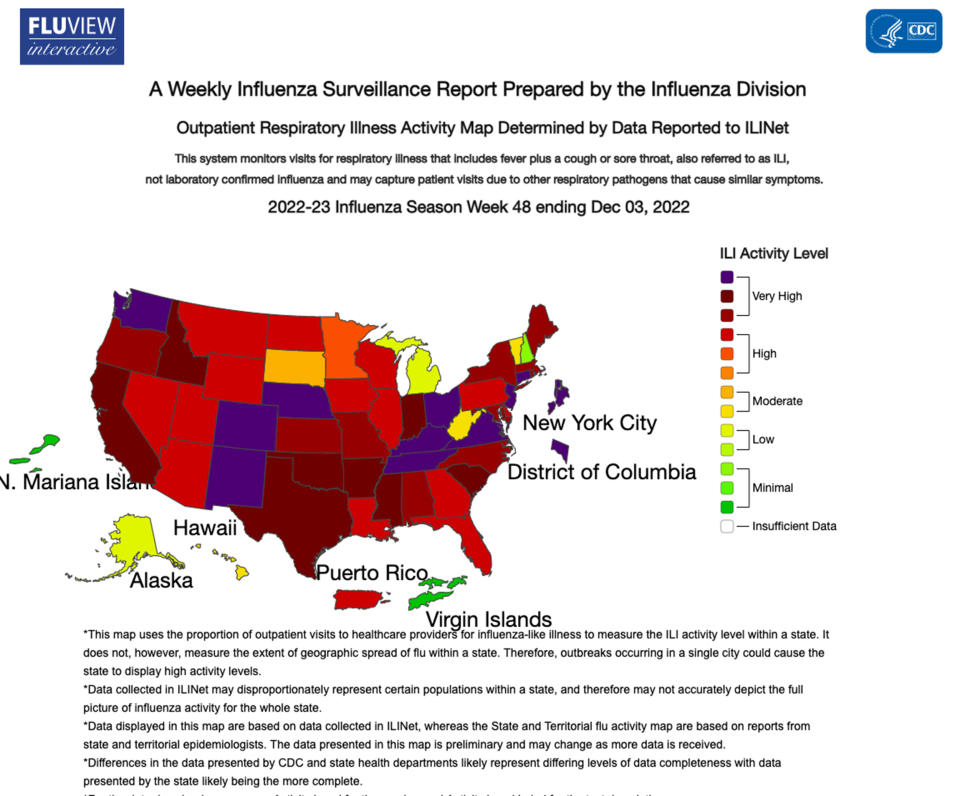Doctor shares his 8 strategies to protect himself from winter viruses
With a tripledemic of flu, RSV and COVID-19 sickening kids and adults across the U.S., primary care doctors are on the front lines of viral illnesses causing all the misery.
Dr. Gary LeRoy, a family physician in Dayton, Ohio, and past president of the American Academy of Family Physicians, actually calls it a “quadremic” because he adds the common cold into the mix of ailments circulating right now.
“In my career, and that’s 30-something years now, I‘ve just never seen a post-holiday outbreak of viral illnesses as significant as we’ve seen this year,” LeRoy tells TODAY.com.
“It seems like half of my patients that I saw one afternoon had some form of upper respiratory illness, especially after the Thanksgiving holiday travel… It’s not something that’s just going to go away in any immediate sense because we haven’t even gotten to the Christmas holiday yet.”

Winter is traditionally cold and flu season. So how does a primary care doctor surrounded by so many ill patients stay healthy at this time of the year? LeRoy shares these tips, which can help anyone trying to avoid getting sick right now:
Stay up to date with vaccines
That’s “first and foremost” on LeRoy’s checklist. He started out with getting his flu vaccine earlier than usual after hearing warnings about a bad flu season in the Southern Hemisphere, which can predict what will happen in the U.S.
He’s also on his fourth COVID-19 shot.
Keep masking and hand washing
LeRoy’s practice never stopped requiring masks, so he wears one during office hours. When he’s outside of work, the doctor decides whether to wear a mask in public indoor places on a case-by-case basis.
When people were packed into stores during the Thanksgiving holiday, for example, LeRoy wore a mask. When there are fewer shoppers around, he might not wear a mask but keep his distance from others. He consciously avoids crowds, going to movies at off times or doing grocery shopping late in the evening when there are fewer people around.
“I’m still that guy who tends to stand about 6 feet away from the person who in line ahead of me at the grocery store,” he says.
“And I’m a hand washing aficionado — when I touch things I know other people have touched, I tend to sanitize or wash my hands.”
Focus on a healthy diet
“Our immune system needs the proper nutrition, hydration and sleep to build up itself so it can attack the invading viruses,” LeRoy says.
He avoids foods high in sugar, sodium and carbohydrates, focusing instead on a balanced variety of fruits and vegetables, especially green leafy vegetables such as salad greens, kale and spinach, which are rich in vitamins.
The doctor is a firm believer in staying hydrated and drinks lots of water throughout the day.
“I’m a diabetic so it’s very important for me to stay hydrated to keep my sugars under control,” he says. “Your immune system is not going to function efficiently if your diabetes is out of control.”
Don’t rely on vitamins or supplements
They’re not a substitute for eating a balanced diet, LeRoy warns. He tries to get the nutrients his body needs through food.
“Sometimes, we take these mega vitamins and they’re far beyond the recommended daily adult requirements, so we end up just having very expensive urine and stool,” he notes.
Exercise every day
LeRoy’s exercise of choice is walking and he’s made it a habit to walk a mile or two during his lunch so that he gets 10,000 steps in each day. He also aims to get 30 minutes of aerobic exercise — any movement that makes his heart rate go up — every day.
If you’re not moving, it’s like taking a car and sticking in the garage for the winter — things don’t work as well when that car has been standing still, he notes.
“We’re cardiovascular entities,” LeRoy says. “One way of getting (the heart) to become more efficient in its circulation of the oxygen and blood through our bodies is through exercise. That helps work in concert with our immune system to make sure the white blood cells that fight off disease are getting where they’re supposed to get to.”
People feel so refreshed and renewed after exercise because things are moving through the body, he adds.
Seek out fresh air and sunlight
LeRoy has a gym membership, but he tries to walk outdoors whenever the weather allows.
“I really enjoy going outside. Not only does it provide you the fresh air that you need, but it really revitalizes you emotionally and mentally,” he says.
“When I go a week or so where there are just no sunshiny days, you start feeling the blahs of not having that sunlight around. When the sun comes out, that’s when it’s good to get out and spend more time outside.”
Get enough sleep
LeRoy recommends seven to eight hours night, leaning more towards eight, because it’s while we’re sleeping that the body is refurbishing or building our immune system.
“Your immune system has to have time to manufacture the necessary elements that fight off diseases, bacteria and viruses, and it does so when the body is not actively moving,” he says.
“We have to stop and shut the engines down so that they can turn their attention to building up these molecular antibodies that protect our body.”
Do things that bring you joy
“One of the things that can further break down the immune system is depression and anxiety, and just emotional kind of doldrums that happen during these winter months with the gray skies and coldness,” LeRoy says.
“We just sit in place and we don’t eat right, we don’t sleep right and we don’t find enjoyment in being inside. So trying to do things that bring you joy (can help).”
This article was originally published on TODAY.com

